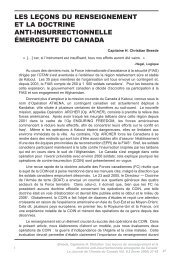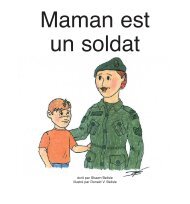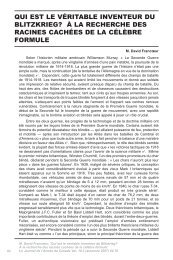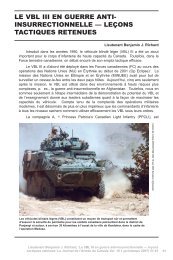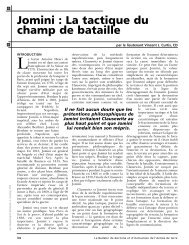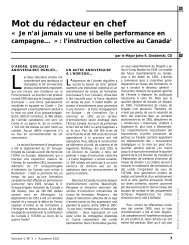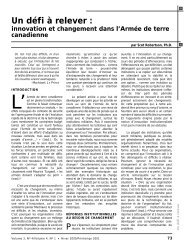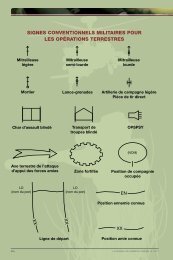The Canadian Army Journal
The Canadian Army Journal
The Canadian Army Journal
You also want an ePaper? Increase the reach of your titles
YUMPU automatically turns print PDFs into web optimized ePapers that Google loves.
Concluding Remarks<br />
This article has briefly analyzed the requirement for the CF to consider the<br />
employment of military provider firms (MPFs) as a potential solution to sustaining<br />
operations in the 21st century. <strong>The</strong> CF has reached a point in its operations where the<br />
subject can no longer be avoided. Indeed, it may be the next, if not inevitable, then<br />
inexorable move in the privatization of war.<br />
Defining what a private military company is and does is a near impossible task given<br />
the myriad views on the industry. Several broad categories of services have emerged,<br />
ranging from pure support services such as logistics provided by military support firms<br />
(MSFs), through training and strategic planning services provided by military consulting<br />
firms (MCFs), to security services up to and including armed combat, the latter described<br />
as MPFs. <strong>The</strong>se companies range from small, virtual entities to branches or wholly<br />
owned subsidiaries of much larger transnational corporations. Where there appears to<br />
be a relative agreement among commentators is the reasons for the spectacular rise of<br />
the industry post-Cold War. <strong>The</strong> decline in superpower interest to act in various parts of<br />
the world, and the loss of state monopoly on the use and means of violence are key<br />
factors. Also, the rise of a market oriented global economy and a conservative ideology<br />
have led to the axiom that private industry can do things far more efficiently and<br />
effectively than what the government or the public trust can do, in what is often<br />
considered the last bastion of state control—the conduct of conflict.<br />
Given the long historical tradition of employment of mercenary forces and private<br />
militaries by western actors, the CF has a number of pressing reasons to contemplate<br />
the use of MPFs to support operations. To begin with, the CF is merely mirroring a trend<br />
being followed by other western military services. <strong>The</strong> largest area that has impacted<br />
western militaries is the employment of MSFs. This development has emerged in other<br />
countries, primarily the US, but also the UK and Australia. <strong>The</strong> CF Contractor<br />
Augmentation Program (CANCAP) is the <strong>Canadian</strong> military’s expression of this, and is<br />
being used in relatively high risk theatres such as Afghanistan. Indeed, the CF has<br />
reached the point (much like other western militaries) that extended expeditionary<br />
operations could not likely be carried out without contracted support.<br />
Next, private military industry has moved into the realm of providing services in an<br />
area that western militaries have often considered a “core” function, that of training<br />
recruits and soldiers conducting basic occupation training. This has led to the<br />
partnership with MCFs in the delivery of basic occupation training in such initiatives as<br />
the NATO Flying Training in Canada (NFTC) program and some aspects of basic <strong>Army</strong><br />
training. This also reflects the experience of Canada’s allies, particularly the US military,<br />
which also moved into the realm of contracting out what used to be considered “core”<br />
training functions under the purview of the uniformed services.<br />
In keeping with our allies it would appear that the next logical step for Canada is the<br />
employment of MPFs in support of military operations. <strong>The</strong> US experience in this sphere<br />
is definitive. Iraq has demonstrated that the US government, particularly the State<br />
Department and the Pentagon, have turned to MPFs to fill the gap caused by a shortage<br />
of US military forces on the ground to conduct a myriad of personal protection,<br />
infrastructure security and convoy escort tasks. <strong>The</strong>se MPFs have been involved in<br />
bloody and deadly combat. <strong>The</strong> CF is no different than its allies and will not be immune<br />
to personnel shortages, and to carry out all the tasks assigned to a CF commander in<br />
theatre, the CF may need to resort to MPFs to successfully accomplish missions.<br />
In terms of recruiting and retention, there is little to indicate that the CF will be able<br />
to generate the number of forces necessary to meet the demands of the post-Cold War<br />
environment. An examination of <strong>Canadian</strong> society as a whole indicates a number of<br />
<strong>Canadian</strong> <strong>Army</strong> <strong>Journal</strong> Vol. 11.1 Spring 2008<br />
93


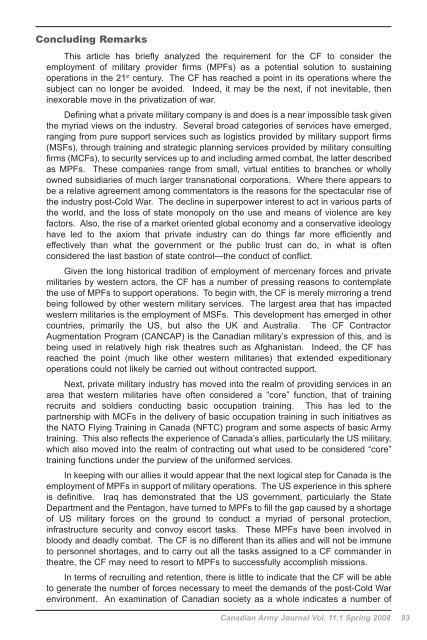
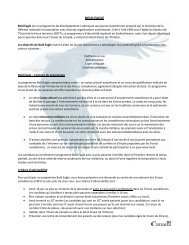

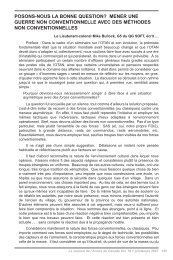

![La modularite dans l'Armee de terre canadienne [pdf 1.6 MB]](https://img.yumpu.com/17197737/1/188x260/la-modularite-dans-larmee-de-terre-canadienne-pdf-16-mb.jpg?quality=85)
